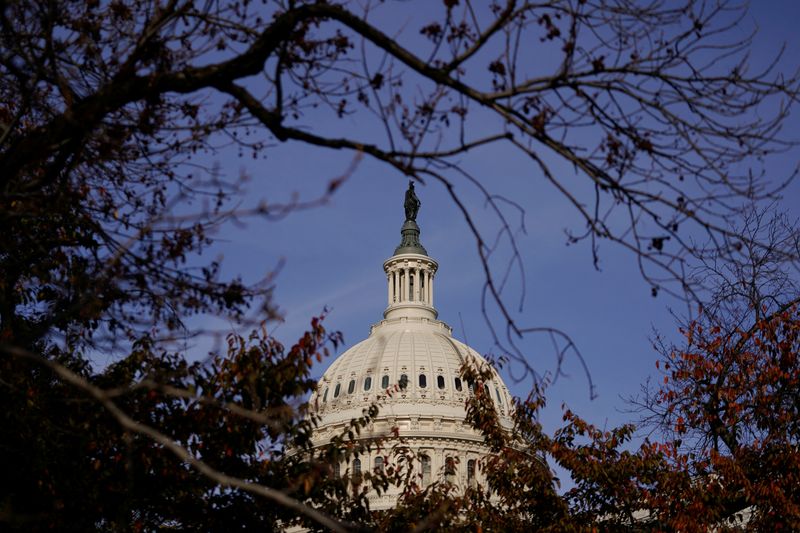By Andy Sullivan
WASHINGTON - President-elect Donald Trump has said he might install his picks for top administration posts without first winning approval in the U.S. Senate. This would erode the power of Congress and remove a significant check on his authority as president.
HOW IS A CABINET APPROVED?
According to the U.S. Constitution, the Senate and the president share the power of appointing top administration officials. Typically, senators question nominees for Secretary of Defense and other top posts at public hearings before voting on their fitness for office.
Roughly 1,000 government positions require Senate confirmation through a majority vote in the 100-seat chamber.
Most of Trump's Cabinet picks easily won confirmation during his first 2017-2021 term in office. But the Senate rejected some candidates and others, like Labor Secretary nominee Andrew Puzder, were forced to withdraw after it became clear they would not have enough support to win a confirmation vote.
The process has slowed as partisan divisions have deepened. Democratic President Joe Biden's cabinet appointees took an average of 191 days to win confirmation compared with an average of 85 days for Republican President George W. Bush, according to the Partnership for Public Service, which oversees presidential transitions.
WHAT HAS TRUMP CALLED FOR?
This time around, Trump wants the Senate to give up that gatekeeping role and allow him to make "recess appointments," even though his Republicans will control the chamber next year with at least 52 seats.
He has called for the chamber to adjourn after he takes office in January, which would allow his personnel to take their positions without having to undergo Senate scrutiny.
That would allow boundary-pushing picks like former Representative Matt Gaetz to serve as U.S. attorney general and vaccine skeptic Robert F. Kennedy Jr. to take charge of the Department of Health and Human Services.
HOW DO 'RECESS APPOINTMENTS' WORK?
The U.S. Constitution says the president can make recess appointments to fill vacant positions when the Senate is not in session, though officials appointed in this manner can only serve two years at most.
Past presidents have taken advantage of this clause. Democrat Barack Obama made 32 recess appointments, while Bush made 171, according to the Congressional Research Service.
Since 2007, Congress had increasingly used scheduling tricks to prevent this from happening.
Rather than formally adjourning when it wants to leave town, the Senate now typically holds occasional "pro forma" sessions in which a single lawmaker briefly wields the gavel but no work is done, keeping the chamber technically in session.
The Supreme Court upheld this practice in 2014, ruling that a president can only make a recess appointment when the Senate is out of session for 10 days or longer.
Trump's gambit would require the Senate to adjourn for at least that long, which could be difficult. It's not clear how many Republicans would voluntarily give up one of the Senate's most significant powers.
CAN TRUMP FORCE A RECESS?
Maybe. The Constitution gives the president the power to adjourn Congress when the Senate and the House of Representatives disagree on whether they should leave town. Trump could invoke this power if the Republican-controlled House votes to adjourn and the Senate does not.
That tactic has never been used before, according to conservative scholar Ed Whelan, who called on House Speaker Mike Johnson to reject it. "Johnson can and should immediately put an end to this scheme," he wrote in the Washington Post on Nov. 14.
WILL REPUBLICANS OPPOSE TRUMP?
Republicans will control the House and the Senate by narrow margins next year, giving them little room for error if they want to go along with Trump's proposal.
In the Senate, Trump allies like Florida Senator Rick Scott quickly signaled support while other Republicans have said they are reluctant to surrender such a significant power.
Incoming Senate Republican Leader John Thune has not ruled it out. "All options are on the table, including recess appointments," he said on Fox News on Nov. 14.

Republicans could warm to the idea if Democrats manage to block or slow down some of Trump's nominees next year. A recess appointment could allow them to avoid having to hold up-or-down votes on a divisive nominee like Kennedy, a former Democrat who has spread misinformation on vaccines and supports abortion rights.
In the House, Johnson, a close Trump ally, has not yet publicly said what he thinks of the idea. If he were to pursue it, he would have to keep nearly all of his fellow Republicans on board as he will likely start next year with a majority of fewer than three votes in the 435-seat chamber.